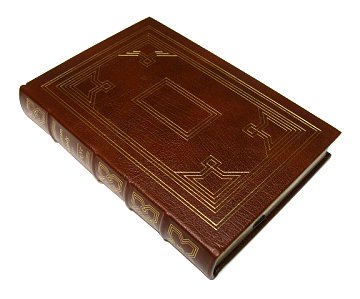Fraud in the Book BizHow and When Does It Become So?by Craig Stark #175 17 January 2016 |
I'm not much of a policeman. I spend a lot of time buying books on eBay, so it's inevitable that I run across misrepresented books - a lot of misrepresented books. To be charitable, I
assume that most of them aren't deliberate misrepresentations, and mostly I just move on when I see them. Even if I felt so inclined, there wouldn't be time to address every last one of them,
and if I tried, I'm not sure it would foster much goodwill or even change most seller's practices. I sometimes make an exception when a book is represented, for example, as a First Edition,
is anything but, and it's getting bid up and up - and it's clear that the buyer will be hugely over-paying for something that isn't what the seller says it is. Mostly I get polite replies
from sellers. Sometimes no reply. Much less often do I get push back. I guess this is some indication that most sellers want to do the right thing.
But certain things nag at me some. Some booksellers do indeed appear to be deliberately misrepresenting things, some more egregiously than others. When one of these sellers is grossing
several hundred thousand dollars a year - you can quickly get this number on Terapeak, by the way - it gives me pause, especially when I've been seeing this go on for several years.
One such seller is perhaps familiar to some of you. He (or she, to keep this as anonymous as possible) has been the topic of more than one forum discussion in the past. The business model
is pretty simple: Acquire so-called fine press reprints published by Easton Press, Franklin Library, the First Edition Library, etc., price them at four or five or more times what they
typically sell for, and describe them not only as First Editions but also as First Printings.
The Best Offer feature is also part of this approach, and I suspect that some buyers who snag
one of this seller's books for $200 that was priced at $275 feel as though they got a bargain, notwithstanding that it could've been had for $30 or $40 elsewhere.
Now, there are such things as Easton Press and Franklin Library First Editions, but most of the output from these publishers has consisted of reprints over the years - and the above model
focuses on reprints. A case, albeit weak, could be made for designating one of these reprints as, say, a First Easton Press printing (though this seller makes no attempt to do this), but far
be it from me how one would make this determination. I know of no issue points that would betray the printing state. Do you? This seller cites none. There are copyright dates present, but these
are usually carried through in later printings and of course have nothing to do with publication dates. In some cases there are also binding variants, occasionally format variants, but even
then some binding designs are carried through multiple printings as well. Whatever the case, these books aren't collected on the basis of printing state, so things seem moot at first glance.
But they aren't if buyers are getting fleeced.
I can't confirm this personally, but there are booksellers who have said publicly (and on occasion to me privately) that this seller has purchased books from them, so it's at least possible
that some or perhaps much of their inventory is acquired online. The numbers make sense. We could call this arbitrage. Ordinarily, I am a champion of arbitrage - buying books, building value
into them through various means (knowledge being one of the most honorable), and reselling them at a profit. But this is different. It would be one thing to buy a First Edition not so described
as one because the seller didn't know better and resell it with a description confirming that it was; it's another thing altogether to represent it as a First Edition if it isn't one, let alone
a First Printing.
In the book biz First Edition identification is what I would call a soft target. As it is, many booksellers have trouble mastering it, but far more buyers than sellers are clueless, and it
doesn't seem to take much to fool some of them. IMO, knowingly misrepresenting an Easton or Franklin reprint as a First Edition, First Printing is exploitative at best and fraudulent at worst.
But what do you think? Are you cool with this bookseller making a six-figure income on this basis? I'm wondering if this is an issue of principle period or an issue of principle on the basis
of the scale in which it's being perpetrated, as in a one- or two-time offense wouldn't merit our attention but deriving a significant income from it would?

Copyright 2003-2016 by BookThink LLC